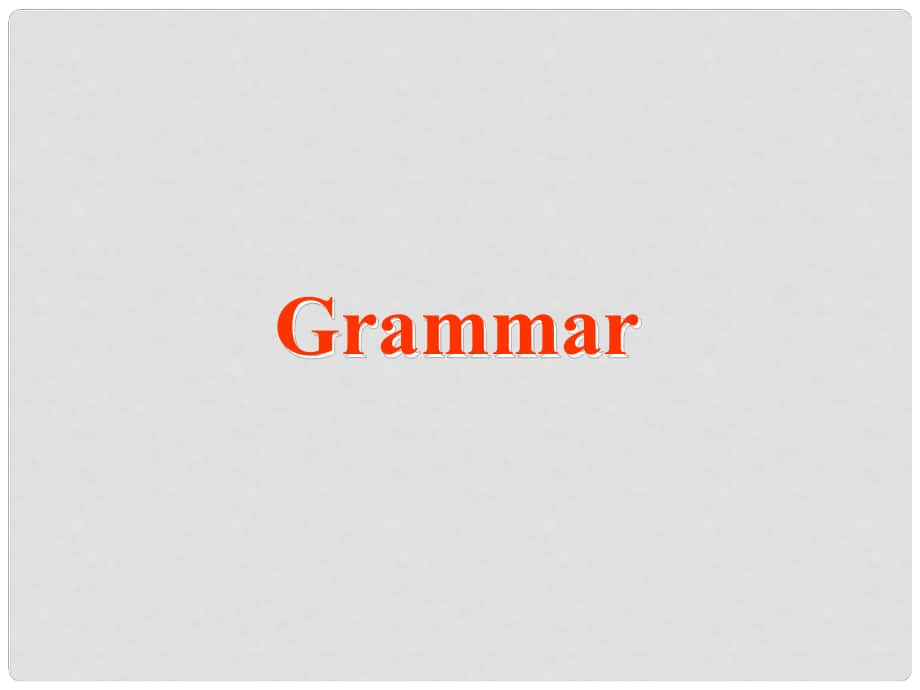《高中英語(yǔ) Module 4 A Social SurveyMy Neighbourhood Grammar課件1 外研版必修1》由會(huì)員分享��,可在線閱讀�,更多相關(guān)《高中英語(yǔ) Module 4 A Social SurveyMy Neighbourhood Grammar課件1 外研版必修1(24頁(yè)珍藏版)》請(qǐng)?jiān)谘b配圖網(wǎng)上搜索�����。
1��、Grammar 現(xiàn)在完成時(shí)現(xiàn)在完成時(shí)(Present perfect tense)(一一) 現(xiàn)在完成時(shí)的基本用法:現(xiàn)在完成時(shí)的基本用法:1. 表示動(dòng)作到現(xiàn)在為止已經(jīng)完成或剛表示動(dòng)作到現(xiàn)在為止已經(jīng)完成或剛剛完成���。剛完成。 I have finished my work. We have set up many new factories.2. 動(dòng)作發(fā)生在過(guò)去動(dòng)作發(fā)生在過(guò)去, 強(qiáng)調(diào)對(duì)現(xiàn)在的結(jié)果���、強(qiáng)調(diào)對(duì)現(xiàn)在的結(jié)果��、影響等����。影響等����。 Have you ever seen the film “Harry Potter”? Ive spent 3 years in the countryside. 3.
2���、表示動(dòng)作發(fā)生在過(guò)去表示動(dòng)作發(fā)生在過(guò)去,并且一直持續(xù)并且一直持續(xù)到現(xiàn)在到現(xiàn)在, 甚至還可能繼續(xù)下去甚至還可能繼續(xù)下去, 句中句中使用持續(xù)性動(dòng)詞使用持續(xù)性動(dòng)詞, 且常有表示一段時(shí)且常有表示一段時(shí)間的時(shí)間狀語(yǔ)��。間的時(shí)間狀語(yǔ)���。We havent seen each other for ten years.Ive been an English teacher for about 20 years.4. 現(xiàn)在完成時(shí)可以用在條件或時(shí)間狀語(yǔ)現(xiàn)在完成時(shí)可以用在條件或時(shí)間狀語(yǔ)從句中從句中, 表示將來(lái)某個(gè)時(shí)刻之前已經(jīng)完表示將來(lái)某個(gè)時(shí)刻之前已經(jīng)完成的動(dòng)作���。成的動(dòng)作。e.g. Ill go home as soon
3�����、as I have finished my homework. Please lend me that book if you have finished reading it. (二二) 使用現(xiàn)在完成時(shí)的句型使用現(xiàn)在完成時(shí)的句型1) 現(xiàn)在完成時(shí)現(xiàn)在完成時(shí)+since + 點(diǎn)時(shí)間狀語(yǔ)點(diǎn)時(shí)間狀語(yǔ)(名詞�、名詞、短語(yǔ)����、從句短語(yǔ)、從句,其中從句用一般過(guò)去時(shí)其中從句用一般過(guò)去時(shí))2) 現(xiàn)在完成時(shí)現(xiàn)在完成時(shí)+ for+ 段時(shí)間狀語(yǔ)段時(shí)間狀語(yǔ) 3) It / This is the first /其他序數(shù)詞其他序數(shù)詞/ last time + that 從句中從句中,從句使用現(xiàn)在完成從句使用現(xiàn)在完成時(shí)����。時(shí)。
4�、 注意注意: 在下面的句子中在下面的句子中, 主句的謂語(yǔ)主句的謂語(yǔ)動(dòng)詞常用一般現(xiàn)在時(shí):動(dòng)詞常用一般現(xiàn)在時(shí): It is three years since I began to work on the farm. Its a long time since I saw you last.現(xiàn)在完成時(shí)表示某一已經(jīng)完成的動(dòng)作現(xiàn)在完成時(shí)表示某一已經(jīng)完成的動(dòng)作對(duì)現(xiàn)在造成的結(jié)果或影響對(duì)現(xiàn)在造成的結(jié)果或影響, 強(qiáng)調(diào)的是強(qiáng)調(diào)的是現(xiàn)在的情況現(xiàn)在的情況,所以不能與表示過(guò)去的所以不能與表示過(guò)去的時(shí)間狀語(yǔ)連用時(shí)間狀語(yǔ)連用; 一般過(guò)去時(shí)只表示某一般過(guò)去時(shí)只表示某一動(dòng)作或狀態(tài)在過(guò)去發(fā)生或存在過(guò)一動(dòng)作或狀態(tài)在過(guò)去發(fā)生或存在
5、過(guò), 與現(xiàn)在不發(fā)生聯(lián)系與現(xiàn)在不發(fā)生聯(lián)系,它可以與表示過(guò)它可以與表示過(guò)去的時(shí)間狀語(yǔ)連用�。去的時(shí)間狀語(yǔ)連用。( (三三) )現(xiàn)在完成時(shí)與一般過(guò)去時(shí)的區(qū)別現(xiàn)在完成時(shí)與一般過(guò)去時(shí)的區(qū)別: :He has read that book. (說(shuō)明他現(xiàn)在知道那本書(shū)的內(nèi)容說(shuō)明他現(xiàn)在知道那本書(shū)的內(nèi)容)He read that book last year. (只說(shuō)明他去年讀過(guò)那本書(shū)只說(shuō)明他去年讀過(guò)那本書(shū) )He has gone to America. (他現(xiàn)在不在此地他現(xiàn)在不在此地, 在美國(guó)在美國(guó))He went to America. (只說(shuō)明他去過(guò)美國(guó)只說(shuō)明他去過(guò)美國(guó))(四四) 終止性動(dòng)詞與延續(xù)性動(dòng)詞:終
6�、止性動(dòng)詞與延續(xù)性動(dòng)詞:1. 終止性動(dòng)詞終止性動(dòng)詞: 表示短暫的運(yùn)動(dòng)狀態(tài)表示短暫的運(yùn)動(dòng)狀態(tài),不能和表示一段時(shí)間的狀語(yǔ)連用不能和表示一段時(shí)間的狀語(yǔ)連用,常常用的動(dòng)詞有用的動(dòng)詞有: come, go, start, begin, leave, arrive, reach, get, get up , join, marry, open, close, give, lend, borrow, finish, break, see, hear, notice, find, understand, die 等。等。2. 延續(xù)性動(dòng)詞延續(xù)性動(dòng)詞: 表示長(zhǎng)時(shí)間的運(yùn)動(dòng)狀態(tài)表示長(zhǎng)時(shí)間的運(yùn)動(dòng)狀態(tài),能和表示一段時(shí)間的狀
7����、語(yǔ)連用。能和表示一段時(shí)間的狀語(yǔ)連用����。 常用的動(dòng)詞有常用的動(dòng)詞有: live, study, work, teach, stay, read, play, fly, talk, rain, eat, run等等 1. - How are you today? - Oh, I _ as ill as I do today for a very long time. A. didnt feel B. wasnt feeling C. dont feel D. havent felt2. - _ David and Vicky _ married? - For about three years. A
8、. How long have; been B. How long have; got C. How long were; being D. How long did; get3. It is the third time you _ late this week. A. had arrived B. arrived C. have arrived D. are arriving4. - Did you enjoy your holiday? - Wonderful. It is years _ I enjoyed myself so much. A. after B. when C. bef
9�、ore D. since5. When I was at college, I _ three foreign languages, but I _all except a few words of each. A. spoke; had forgotten B. spoke; have forgotten C. had spoken; had forgotten D. had spoken ; have forgotten6. - Where _ the recorder? I cant see it anywhere. - I _ right here. But now its gone.
10、 A. did you put; have put B. had you put; was putting C. have you put; put D. were you putting; have put7. The price _, but I doubt whether it will remain so. A. went down B. will go down C. was going down D. has gone down8. They are discussing the problem the whole afternoon, but they _ a decision
11�、so far. A. didnt reach B. wont arrive at C. havent come to D . all above9. I have bought an English-Chinese dictionary. When and where _ you _ it? A. do; buy B. did; buy C. have; bought D. had; bought10. I heard the peasants here _ very poor in the past. Yes, but there _ great changes in the past fe
12、w years. A. were; were B. have been; have been C. have been; were D. were; have beenmovedComplete the conversation. Use thepreset tense of the verbs in brackets, and for or since where appropriate. Mike: Hi, Kate. Kate: Hi, Mike. Mike: I havent seen your brother around for a long time. _ he _ (move
13���、) to a new neighborhood? HasKate: No, he _ _ (move ) to a new country! He _ _ (be) in Australia _ last year.Mike: Australia! Thats great country. _ you ever _ (be) there?hasnt movedhas been sinceHave beenKate: No, I _ never _ (be) there, but I _ _ (decide) to go later this year.Mike: Great! _ your brother _ (send) you any photos _ he moved there?havehave decidedHassincebeensent Kate: Yes, in fact, I _ just _ (receive) some. Here they are. This is his new house. He _ recently _ (finish) decorating it.receivedhas finishedhave
 高中英語(yǔ) Module 4 A Social SurveyMy Neighbourhood Grammar課件1 外研版必修1
高中英語(yǔ) Module 4 A Social SurveyMy Neighbourhood Grammar課件1 外研版必修1

